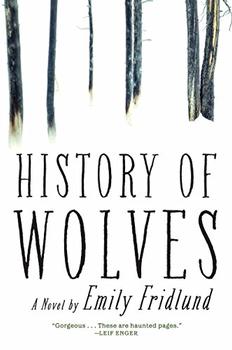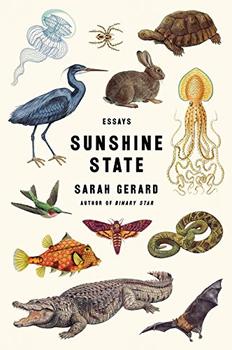Summary | Excerpt | Reviews | Beyond the book | Read-Alikes | Genres & Themes | Author Bio

A Memoir from Anywhere but Here
by Angela PalmRiverine has a very strong sense of place, revealing how traces of the past are still visible in the landscape around us and how our environment shapes who we are. Palm grew up along Indiana's flood-prone Kankakee River, in an underprivileged area between the towns of Hebron and Demotte. Early on she felt caught in the middle, unwanted – "A bookish fishergirl who longed for the social opportunities of a cookie-cutter subdivision." Yet this was probably the source of her fondness for in-between, unloved spots.
One of the most important people in Palm's growing-up years was Corey, an older neighbor boy she had a crush on. Corey was a juvenile delinquent later expelled for bringing a gun to high school. Although he and the author drifted apart, she was devastated to learn that he had been sentenced to life in prison for murdering their two elderly neighbors. Coming off of heroin and desperate for money, he'd broken in to their house, looking for valuables and thought no one was home. When confronted, he slit the couple's throats and drove off in their car.
As the years passed, Palm continued to be haunted by Corey's crime. In college she took criminal justice classes and learned different theories about what prompts illegal behavior (see 'Beyond the Book'). Even after she moved to Vermont, married, and had two babies within 18 months, she couldn't stop thinking about her old friend. In her 30s, she resumed a correspondence with Corey and went to visit him in an Indiana prison. It was hard to avoid playing the "what if" game: Could she have saved him? Was he the same person he had always been? By pleading guilty, he had avoided the death penalty. But did he really deserve to spend the rest of his life behind bars for a decision made as a teenager?
Palm's visit with Corey is one of the book's highlights. Her relationship with him causes her to question how people change over time: "Like rivers, people are always folding back on themselves, and then straightening again. Contradicting themselves," she writes. The overarching metaphor of the river, as in the title, is a powerful one, likening life to the random course of a stream. Whether living in fear of the urban unknown in Indianapolis, trying to find confidence in herself as a writer in her adopted New England home, or pondering where the future will lead when she's happy in her marriage yet still half in love with an incarcerated man, she is always aware of life's unpredictable flow.
In keeping with the fluid water imagery, there is sometimes a stream-of-consciousness element to Palm's writing. "Essays often veer away from their centers," she acknowledges, and many of the chapters do digress frequently. That plus the occasional commentary on quotations from writers like Annie Dillard and Joan Didion can somewhat break up the narrative, making the book seem more like a set of essays than a coherent memoir, which is how this is being billed. It might be more appropriate then to think of Riverine as a series of autobiographical essays that together tell the story of a life in progress.
Even if I might have preferred a more straightforward chronological account, I admire Palm's experimentation with form. As a work in progress, Riverine won the Graywolf Press Nonfiction Prize in 2014. The out-of-the-ordinary writing style and contents – a dreamy blend of coming-of-age story, true-crime investigation, and writerly introspection – should appeal to readers of essayists such as Leslie Jamison, Eula Biss, Joni Tevis, and Rebecca Solnit. These evocative meditations on "place as lifeline" and personality as mutable will urge you to reconsider your own path – what has brought you to where you are now and what has remained the same during the drifting, unexpected course of a life.
![]() This review
first ran in the September 21, 2016
issue of BookBrowse Recommends.
This review
first ran in the September 21, 2016
issue of BookBrowse Recommends.

If you liked Riverine, try these:

by Emily Fridlund
Published 2017
Winner of the McGinnis-Ritchie award for its first chapter, Emily Fridlund's propulsive and gorgeously written History of Wolves introduces a new writer of enormous range and talent.

by Sarah Gerard
Published 2017
Sarah Gerard follows her breakout novel, Binary Star, with the dynamic essay collection Sunshine State, which explores Florida as a microcosm of the most pressing economic and environmental perils haunting our society.
Your guide toexceptional books
BookBrowse seeks out and recommends the best in contemporary fiction and nonfiction—books that not only engage and entertain but also deepen our understanding of ourselves and the world around us.